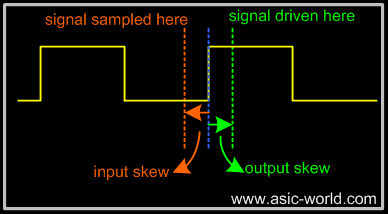|
|
| |
|

|
|
|
|
| |
|

|
| |
 |
Clocking Block
|
|
|
SystemVerilog adds the clocking block that identifies clock signals and captures the timing and synchronization requirements of the blocks being modeled. A clocking block assembles signals that are synchronous to a particular clock and makes their timing explicit. |
| |
|

|
|
|
Clocking block supports following features |
| |
|

|
|
|
- Input sampling
- Synchronous events
- Synchronous drives
|
| |
|

|
|
|
|
| |
|

|
| |
 |
Input and Output Skews
|
|
|
Normally inputs are sampled at clock edge and outputs are driven at clock edge in a cycle based code (Verification and design). If skew is specified, then input is sampled skew time before clock edge and output is driven after the skew time. |
| |
|

|
|
|
This is shown in figure below. A skew must be a constant expression and can be specified as a parameter. If the skew does not specify a time unit, the current time unit is used. If a number is used, the skew is interpreted using the timescale of the current scope. |
| |
|

|
|
|
 |
| |
|

|
| |
|

|
| |
 |
Example : input output skews
|
| |
|

|
|
|
1 `timescale 1ns/1ns
2 // program declaration with ports.
3 program clocking_skew_prg (
4 input wire clk,
5 output logic [7:0] din,
6 input wire [7:0] dout,
7 output logic [7:0] addr,
8 output logic ce,
9 output logic we
10 );
11
12 // Clocking block
13 clocking ram @(posedge clk);
14 input #1 dout;
15 output #1 din,addr,ce,we;
16 endclocking
17
18 initial begin
19 // Init the outputs
20 ram.addr <= 0;
21 ram.din <= 0;
22 ram.ce <= 0;
23 ram.we <= 0;
24 // Write Operation to Ram
25 for (int i = 0; i < 2; i++) begin
26 @ (posedge clk);
27 ram.addr <= i;
28 ram.din <= $random;
29 ram.ce <= 1;
30 ram.we <= 1;
31 @ (posedge clk);
32 ram.ce <= 0;
33 end
34 // Read Operation to Ram
35 for (int i = 0; i < 2; i++) begin
36 @ (posedge clk);
37 ram.addr <= i;
38 ram.ce <= 1;
39 ram.we <= 0;
40 // Below line is same as @ (posedge clk);
41 @ (ram);
42 ram.ce <= 0;
43 end
44 #40 $finish;
45 end
46
47 endprogram
48
49 // Simple top level file
50 module clocking_skew();
51
52 logic clk = 0;
53 wire [7:0] din;
54 logic [7:0] dout;
55 wire [7:0] addr;
56 wire ce;
57 wire we;
58 reg [7:0] memory [0:255];
59
60 // Clock generator
61 always #10 clk++;
62
63 // Simple ram model
64 always @ (posedge clk)
65 if (ce)
66 if (we)
67 memory[addr] <= din;
68 else
69 dout <= memory[addr];
70
71 // Monitor all the signals
72 initial begin
73 $monitor("@%0dns addr :%0x din %0x dout %0x we %0x ce %0x",
74 $time, addr, din,dout,we,ce);
75 end
76 // Connect the program
77 clocking_skew_prg U_program(
78 .clk (clk),
79 .din (din),
80 .dout (dout),
81 .addr (addr),
82 .ce (ce),
83 .we (we)
84 );
85
86 endmodule
You could download file clocking_skew.sv here
|
| |
|

|
| |
 |
Simulation : input output skews
|
| |
|

|
|
|
@0ns addr :xx din xx dout xx we x ce x
@11ns addr :0 din 24 dout xx we 1 ce 1
@31ns addr :0 din 24 dout xx we 1 ce 0
@51ns addr :1 din 81 dout xx we 1 ce 1
@71ns addr :1 din 81 dout xx we 1 ce 0
@91ns addr :0 din 81 dout xx we 0 ce 1
@110ns addr :0 din 81 dout 24 we 0 ce 1
@111ns addr :0 din 81 dout 24 we 0 ce 0
@131ns addr :1 din 81 dout 24 we 0 ce 1
@150ns addr :1 din 81 dout 81 we 0 ce 1
@151ns addr :1 din 81 dout 81 we 0 ce 0
|
| |
|

|
| |
|

|
| |
|

|
|
|
|
| |
|

|
|
|
|

|

|

|
|

|
|
Copyright © 1998-2025 |
Deepak Kumar Tala - All rights reserved |
|
Do you have any Comment? mail me at:deepak@asic-world.com
|
|